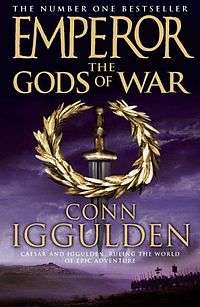The Gods of War
|
The Gods of War first edition cover. | |
| Author | Conn Iggulden |
|---|---|
| Country | United Kingdom |
| Language | English |
| Series | Emperor series |
| Genre | Historical novel |
| Publisher | HarperCollins |
Publication date | 2 January 2006 |
| Media type |
Print (Hardcover, Paperback) Audio (Cassette, CD) |
| Pages | 437 pp (first edition) |
| ISBN | 0-00-716476-9 |
| OCLC | 62088723 |
The Gods of War is the fourth novel in the Emperor series, written by British author Conn Iggulden. The series is historical fiction following the life of Julius Caesar.
Plot summary
Having crossed the Rubicon (the southern border of one of the provinces he controlled, Cisalpine Gaul) Julius Caesar leads his veterans of the Gallic Wars toward Rome, aware that the dictator Pompey has declared him an enemy of the state and his actions will likely end in Civil War. During the journey, his army encounters mild resistance; however, the legions are no match for veterans of Gaul, and Caesar forces the surrender without a single man being killed. He then pardons the legion - the first of many acts of propaganda in the coming war.
The speed of his journey south catches Pompey by surprise, who consequently flees to Greece along with the majority of the Roman Senate. This leaves Rome free for Caesar to enter. He installs Mark Anthony as governor of Rome - much to the disgust of Caesar's lifelong friend Marcus Brutus. Brutus' anger forces him to betray his friend and defect to Pompey, a move which stuns Caesar.
Caesar eventually takes his army to Greece to face an increasingly ill Pompey, who has a much larger force with reinforced supply lines and defended towns. As Pompey's illness takes hold, he begins to make mistakes - including missing the chance to rout Caesar's forces following a failed night-raid on a fort, fearing it to be a trap.
Eventually the armies meet at the Battle of Pharsalus, with Caesar emerging victor from the jaws of defeat. Caesar finds the injured Brutus and forgives his lifelong friend for his betrayal - much to the anger of his general and nephew Octavian. Pompey flees the field, forcing Caesar to chase him; first to Asia Minor and finally to Alexandria in Egypt. It is here that Caesar is presented with the head of Pompey by representatives of boy-king Ptolemy XIII, much to his anger.
While in Egypt, Caesar is introduced to Cleopatra, queen of Egypt and sister of the king. She asks him for help in returning her to the throne after Ptolemy's advisors had her banished. Caesar raids the royal palace and captures the king, returning him to a defended house. He then engages in a romance with his ally Cleopatra. They then make a number of demands in return for the release of her brother. When Ptolemy is released he immediately unleashes his army on the house, besieging Caesar's army. Caesar breaks the siege, by starting a fire in Alexandria port as a distraction, and Ptolemy and his advisors are killed.
Cleopatra and Caesar have a son together, Ptolemy Caesarion. Caesar takes them back to Rome, and begins to announce his plans to create an Empire and rule the world as king. This does not sit well with the Roman public, who were promised a reintroduction of the Roman Republic after the years of dictatorship following Cornelius Sulla and Pompey. Most unhappy with this change in heart is Brutus, who joins a plot to have the Rex(They were afraid he would be another rex) killed.
At this time, Caesar had been planning a campaign in Parthia in an attempt to expand the Roman lands and in a small way to possibly avenge the death of the old Consul Crassus, who had been a possible friend and a major character in The Death of Kings and The Field of Swords. Crassus had died whilst commanding a legion Caesar and Pompey had trained for him.
On the Ides of March Caesar is led to the Theatre of Pompey, and is assassinated by many of the Senators and Marcus Brutus. The date had been prophesized as his death by his companion Cabera in The Field of Swords shortly before he died. After Caesar's death, Brutus again takes up his adopted name - Quintus Servilius Caepio Brutus - to illustrate his links to another famous tyrannicide, Gaius Servilius Ahala, from whom he was descended.
Differences from history
As with other books in the series, Iggulden strays from historical fact for storyline purposes. He includes a Historical Note to explain his reasons. This is obviously a novel and work of art- not a history textbook.
